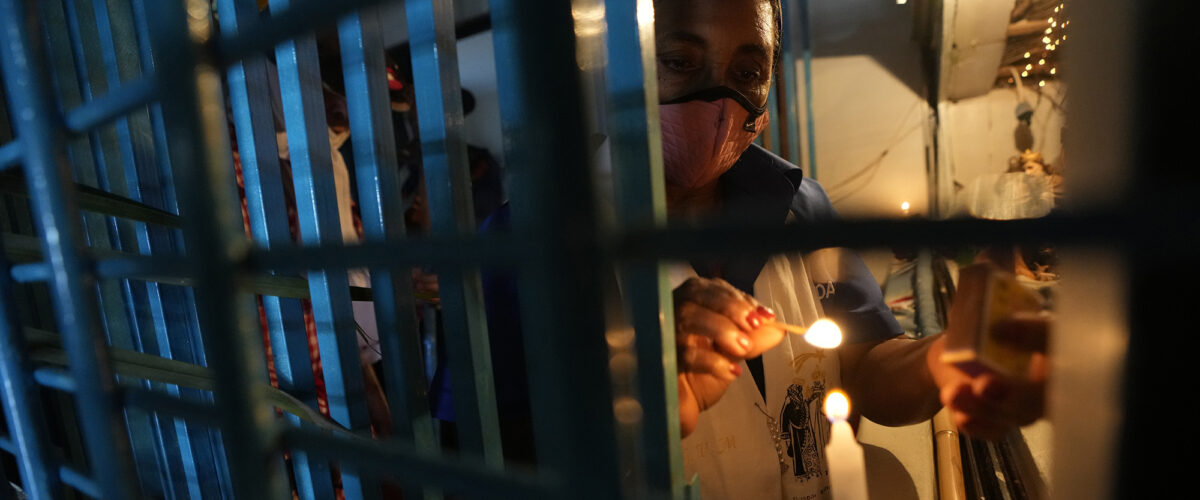If you’ve read or watched the national news this week, you’ve seen two stories dominate the coverage.
One story is the Omicron variant and the increasing number of COVID cases all around the country. Part of that story has included the continued refusal of large swaths of the population to get vaccinated.
The second story is on the one-year anniversary of the Jan. 6 insurrection, the attack on the Capitol to prevent the largely ceremonial function of Congress counting Electoral College votes. Part of this story has included acknowledging the current sad state of American democracy.

Kris Aaron
It can get lost in the headlines, but as Christians, we recognize Jan. 6 for an additional reason: Epiphany.
Epiphany, of course, marks the end of the Christmas season. It’s the 12th day of Christmas, and it celebrates the magi’s arrival in Bethlehem. These wise men come bearing gifts of gold, frankincense and myrrh to honor the birth of Jesus, the King of the Jews, all because they had seen his star at its rising.
The star initially takes them to Jerusalem, where they meet with King Herod. Herod is a self-professed “king of the Jews.” There are just a couple of problems with his profession, though. First, he’s not a Jew; he’s Idumean. Second, Herod rules only because Rome allows him to do so.
Rather than being a real king, Herod is more of a puppet. He’s allowed to act as king as long as he gives proper deference and financial payment to Rome. Consequently, Herod is insecure and paranoid. History tells us that Herod killed some of his wives and sons because he feared they were conspiring against him. In fact, a common saying attributed to the period was that it was better to be Herod’s pig than Herod’s son.
Thus, when the magi come to Jerusalem and meet with Herod, he acts just like we’d expect an insecure and paranoid person to act. Matthew tells us he becomes frightened and all of Jerusalem with him. The self-professed king is ignorant of what has happened just nine miles south of him, so he calls together all the chief priests and scribes of the people to ask where the Messiah is to be born.
While they know the Scriptures and know that the Messiah is to be born in Bethlehem, these religious leaders all have missed what God has been doing in their midst. It takes a group of magi to alert them to what God is doing in their own backyard.
“These religious leaders all have missed what God has been doing in their midst.”
After learning about Bethlehem, the magi take off, but before they do, Herod lies and tells them that he, too, wants to pay homage to the child. Therefore, he’d like for them to send word once they’ve found him. Because we know the rest of the story, we know God speaks to the magi through a dream and warns them not to return to Herod. Instead, they return home by another road. After he learns that he has been tricked, Herod, drunk on power and scared of losing it, has all the children in and around Bethlehem who are two years old or younger killed. The holy family escapes to Egypt to avoid the slaughter of the innocents.
Epiphany gives us much to celebrate, but it also continues to teach us much today. And the lessons it teaches are particularly relevant given the headlines dominating our national news coverage. Epiphany teaches us much because a lot of what passes for Christianity today publicly is what I like to call Herodian Christianity. It’s a Christianity defined by ignorance, fear and the pursuit of political power. And like its namesake, it’s not the real thing either.
If you’re a regular reader of BNG, you’ve read stories about Herodian Christianity. You’ve read stories about people defying vaccine mandates due to misinformation and seeking “religious exemptions,” stories detailing allegations that Southern Baptist Convention leaders mishandled knowledge of sexual abuse within their churches, and stories about Donald Trump Jr. telling a group of evangelical Christians that turning the other cheek has “gotten us nothing.” In short, you’ve read stories about ignorance, fear and the pursuit of political power.
Together, those three elements form a toxic yet tempting brew for many, but if we are truly going to celebrate Epiphany, we have to reject Herodian Christianity.
“To truly celebrate Epiphany, we have to view this holy day not just as a commemoration of gift-giving but as a tangible expression of God’s ever-expanding embrace of all people.”
To truly celebrate Epiphany, we have to view this holy day not just as a commemoration of gift-giving but as a tangible expression of God’s ever-expanding embrace of all people. The heroes in Matthew 2:1-12 aren’t the self-professed “king of the Jews” and his group of religious leaders, but a group of foreigners who practice an entirely different religion.
It is people outside of Israel’s religious establishment who recognize what God is doing. They’re the ones willing to risk danger by traveling a considerable distance with luxurious gifts to pay homage to the real king of the Jews. They’re the ones willing to admit that they don’t have all the answers by seeking to learn from others. And they’re the ones willing to follow God’s leading rather than participate in the machinations of a tyrannical madman.
They pursue knowledge. They refuse to give into fear. And they aren’t interested in chasing or cozying up to political power. Instead, they’re more interested in following after God. May we all can learn the same lessons. Because if the church can put those lessons into practice, we’ll not only be better off for it, but we’ll give this holy day the kind of celebration it truly deserves.
Kris Aaron serves as senior pastor of First Baptist Church in Bristol, Va. He holds the doctor of ministry degree from McAfee School of Theology at Mercer University, the master of divinity degree from Mercer and a master of theology degree from Brite Divinity School at TCU. He is married to Clary Gardner Aaron, and they are the parents of two young children.
Related articles:
Angel wings and devil tails: Meditation on the Feast of the Holy Innocents | Opinion by Ken Sehested
It’s hard to quit Herod, but we must worship another | Opinion by John Inscore Essick
Let’s put Herod back into Christmas | Opinion by Ken Sehested


